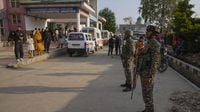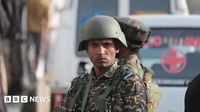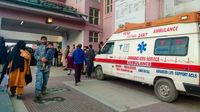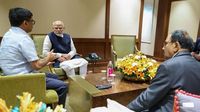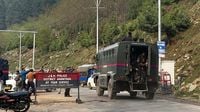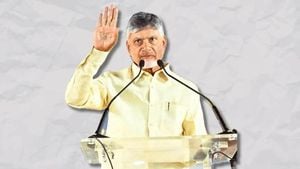On April 22, 2025, a tragic terror attack unfolded in Baisaran Valley, Pahalgam, a popular tourist destination in Jammu and Kashmir, resulting in at least 26 fatalities and numerous injuries. The incident, which occurred around 3 PM, marks one of the deadliest assaults on civilians in the region in recent years, with a significant number of the victims being tourists.
As the day began, Baisaran, often referred to as 'mini Switzerland' for its picturesque landscapes, was bustling with between 1,000 and 1,500 visitors. Tourists were enjoying pony rides, picnicking, and taking photographs against the stunning backdrop of lush green meadows. However, this tranquil scene was shattered when three to four armed men, later identified as members of a militant group known as The Resistance Front, a splinter faction of Lashkar-e-Taiba, opened fire indiscriminately on the crowd.
Witnesses described the chaos that ensued as gunfire erupted. Vinay Bai, a tourist from Gujarat, recalled, "I was on a pony, about to enter Baisaran, when there were gunshots. People started to run for their lives. As I tried to escape, a bullet hit me in the elbow. I don’t know where it came from." Survivors reported that the attackers specifically targeted men while sparing women and children, leading to a scene of horror as many tried to flee.
Pallavi Rao, a Karnataka resident, witnessed her husband, Manjunath, being shot in the head during the attack. "He died on the spot, in front of my eyes. It still feels like a bad dream," she shared. Pallavi recounted her desperate plea to the terrorists, asking them to kill her as well, to which one responded coldly, "I won’t kill you. Go tell this to Modi." This chilling remark has since resonated widely, highlighting the attackers' intent to send a political message.
The attack lasted approximately 20 minutes, during which the assailants moved freely among the tourists, shooting at those who attempted to escape. Eyewitness accounts indicate that the terrorists were dressed in uniforms resembling those of local police, which initially caused confusion among the victims, many of whom mistook them for authorities.
In the wake of the attack, Prime Minister Narendra Modi cut short his visit to Saudi Arabia and returned to India, where he held emergency meetings with senior officials, including National Security Advisor Ajit Doval and External Affairs Minister S. Jaishankar. Modi condemned the attack, stating, "Those behind this heinous act will be brought to justice. Their evil agenda will never succeed." He expressed condolences to the victims' families and assured the nation of the government's commitment to combating terrorism.
As news of the attack spread, outrage erupted across India. Political leaders from various parties condemned the violence, with calls for justice and security measures for tourists in the region. The Congress party's President, Mallikarjun Kharge, emphasized the need for unity and a resolute response to the attack, while former Jammu and Kashmir Chief Minister Mehbooba Mufti called for a complete shutdown in the region as a mark of protest.
International leaders also expressed their condolences and support. US President Donald Trump reached out to Modi to convey his sympathies, stating, "The United States stands strong with India against terrorism." Russian President Vladimir Putin described the attack as a "brutal crime" that must be punished, while Israeli Prime Minister Benjamin Netanyahu reaffirmed Israel's solidarity with India in its fight against terrorism.
The aftermath of the attack has seen heightened security measures in Jammu and Kashmir, with police and military operations underway to locate the perpetrators. Local authorities have also set up helplines to assist those affected by the tragedy. The Jammu and Kashmir administration announced that all private schools in the region would remain closed for a day of mourning.
Eyewitness accounts reveal the chaos that ensued during the attack. One survivor, Asavari Jagdale, recounted how the gunmen entered the tent where her family was hiding and accused them of supporting Modi before opening fire on her male relatives. Another local resident described the panic that ensued, with people fleeing in all directions as gunfire erupted.
In the wake of this tragedy, the tourism industry in Pahalgam, which had been experiencing a resurgence after years of violence, faces an uncertain future. Many tourists have already canceled their plans to visit the area, opting to return home instead. Sameer Bhardwaj, a tourist from Delhi, said, "We've been in Kashmir for the past three days. We had plans for Pahalgam, but given the current situation, we are leaving for Delhi. What happened here is deeply wrong."
The attack has also reignited discussions about the security of tourists in Jammu and Kashmir, a region that has historically been plagued by violence. The Amarnath Yatra, a major pilgrimage that attracts thousands of visitors annually, is set to begin shortly, and authorities are under pressure to ensure the safety of pilgrims and tourists alike.
As the investigation continues, the families of the victims are left grappling with their loss. Pallavi Rao has requested that her husband’s body be airlifted back to Shivamogga, stating, "I want to return to my hometown, but not alone. I will return only with my husband’s body." The emotional toll of this attack will undoubtedly resonate throughout the country for years to come.
The Pahalgam terror attack serves as a stark reminder of the ongoing violence in Jammu and Kashmir and the fragility of peace in the region. As the nation mourns, the call for justice and security grows louder, echoing the sentiments of those who lost their loved ones in this senseless act of violence.
